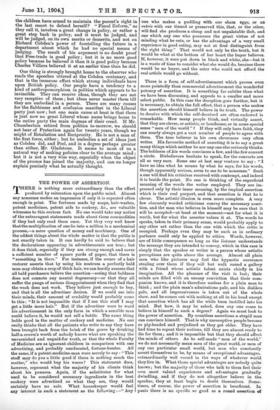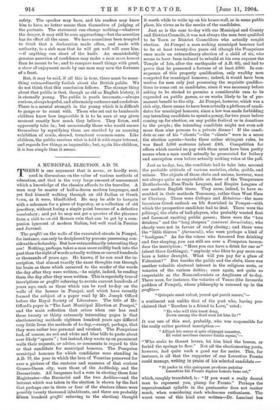T HERE is nothing more extraordinary than the effect produced by
reiteration upon the public mind. Almost any nonsense makes an impression if only it is repeated often enough in print. The fortunes made by soaps, hair-washes, patent medicines, patent aids to cookery, &c., are valuable witnesses to this curious fact. No one would take any notice of the extravagant statements made about these commodities if they had only read them once. Yet they very well know that the multiplication of one lie into a million is a mechanical process,—a mere question of money and machinery. One of the oddest things about the whole matter is that the public is not exactly taken in. It can hardly be said to believe that the declarations appearing in advertisements are true ; but it does think, especially if they are strong enough and cover a sufficient number of square yards of paper, that there is "something in them." For instance, if the owner of a hair restorer asserts that by using his nostrum a perfectly bald man may obtain a crop of thick hair, we can hardly assume that all bald purchasers believe the assertion—seeing that baldness does not connote any mental degeneracy—or that they all suffer the pangs of serious disappointment when they find that the wash does not work. They believe just enough to buy, and that is all the advertiser desires. If we could see into their minds, their amount of credulity would probably come to this "It is not impossible that if I use this stuff I may get a little more hair." But if the advertiser were to word his advertisement in the only form in which a sensible man could believe it, he would not sell a bottle. The same thing holds good in the matter of cookery and medicine. No one really thinks that all the patients who write to say they have been brought back from the brink of the grave by drinking half-a crown's worth of nobody knows what are speaking the unvarnished and unpaid-for truth, or that the whole Faculty of Medicine are as ignorant children in comparison with one advertising, and probably uneducated, fortune-hunter. All the same, if a patent-medicine-man were merely to say : "This stuff may do you a little good if there is nothing much the matter," who would buy his wares ? This statement does, however, represent what the majority of his clients think about his panacea. Again, if the substitutes for what used to be considered necessary ingredients in the best cookery were advertised as what they are, they would certainly have no sale. What housekeeper would feel any interest in such a statement as the following :—" Any
one who makes a pudding with our sham eggs, or an entree with our tinned or preserved this, that, or the other, will find she produces a cheap and not unpalatable dish, and one which any one who possesses the great virtue of not minding what he eats, or has the advantage of a very small experience in good eating, may not at first distinguish from the right thing." That would not only be the truth, but it would be what at the bottom of her heart the buyer believes. If, however, it were put down in black and white, she—but it is a waste of time to consider what she would do, because there would be. no buyer, and the eater who could not afford the real article would go without.
There is a form. of self-advertisement which proves even more pointedly than commercial advertisement the wonderful potency of assertion. It is something far subtler than what we have been discussing, and appeals to a smaller and more select public. In this case the deception goes further, but it is necessary, to obtain the full effect, that a person who makes the assertion should himself believe in its truth. The power to deceive with which the self-deceived are often endowed is remarkable. How many people think, and virtually assert, that they are clever, or artistic, or handsome, or in some special sense "men of the world" ? If they will only have faith, they can nearly always get a vast number of people to agree with them. The true believer in his own cleverness very often writes. His favourite method of asserting it is to say a great many things which neither he nor any one else seriously thinks. The boldness of his words convinces a few, and the few convert a circle. Disbelievers hesitate to speak, for the converts are all so very sure. Some one at last may venture to say : "I have no idea what he means by what he says, for his words, though apparently serious, seem to me to be nonsense." Such a one will find his criticism received with contempt, and indeed it is beside the point. No one is thinking of the superficial meaning of the words the writer, employed. They are im- pressed only by their inner meaning, by the implied assertion which is their real purport, and that assertion is that he is clever. The artistid illusion is even more complete. A very few obscurely worded criticisms convey the necessary asser- tion, and the man who believes in himself may be sure that it will be accepted—at least at the moment—not for what it is worth, but for what the asserter values it at. The words he speaks, taken in their primary sense, would probably apply to any other art rather than the one with which the critic is occupied. Perhaps even they may be such as in ordinary parlance could only be applied to ethics. Words, however, are of little consequence so long as the listener understands the message they are intended to convey, which in this case is simply that the speaker or writer is a person whose artistic perceptions are quite above the average. Almost all plain men who like pictures may feel the hypnotic assurance stealing over them if they will but walk round a gallery with a friend whose artistic talent exists chiefly in his imagination. All the pleasure of the visit is lost; their minds are filled with an uneasy conviction that their com- panion knows, and it is therefore useless for a plain man to think ; and the plain man's admirations pale, and his dislikes pale, and all impressiveness is taken out of the whole show, and becomes out with nothing at all in his head except that assertion which has all the while been instilled into his mind. But how, it may be asked, does any one come to believe in himself to such a degree ? Again we must look to the power of assertion. By countless assertions a stupid man can convince himself. That is why unreceptive people become so pig-headed and prejudiced as they get older. They have had time to repeat their notions, till they are almost ready to die for them; and it is impossible but that they should affect the minds of others. As to self-made "men of the world," we do not necessarily mean men of the great world, or men of any one particular small world, but men who constantly assert themselves to be, by means of exceptional advantages, extraordinarily well versed in the ways of whatever world they live in. What those special advantages are nobody quite knows ; but the majority of those who talk to them feel their own most valued experiences and advantages gradually dwindling, and if they do not altogether believe in the speaker, they at least begin to doubt themselves. Some- times, of course, the power of assertion is beneficent. In panic there is no specific so good as a round assertion of safety. The speaker may have, and his readers may know him to have, no better means than themselves of judging of the portents. The statement can change nothing—whatever the danger, it may still be seen approaching—but the assertion has its effect all the same. We have sometimes been tempted to think that a ' declaration made often, and made with authority, to a sick man that he will get well will cure him, —if anything can short of the knife. An unmistakably genuine assertion of confidence may make a man more honest than he meant to be ; and to compare small things with great, a show of enjoyment made by one man may save the fortunes of a feast.
. But, it may be said, if all this is true, there must be some- thing extraordinarily foolish about the British public. We do not think that this conclusion follows. The strange thing about that public is that, though as old as English history, it is eternally young. The public is youth incarnate,—always curious, always hopeful, and alternately cocksure and credulous. There is a mental strength in the young which it is difficult to gauge or to count with. Those who set out to bamboozle children know how impossible it is to be sure at any given moment exactly how much they believe. They listen, and apparently take in; but occasionally those who would amuse themselves by mystifying them are startled by an amazing exhibition of crude, shrewd, trenchant common-sense. Like children, the public receives what is told it with eager interest, and regards few things as impossible; but, again like children, it is less simple than it seems.











































 Previous page
Previous page